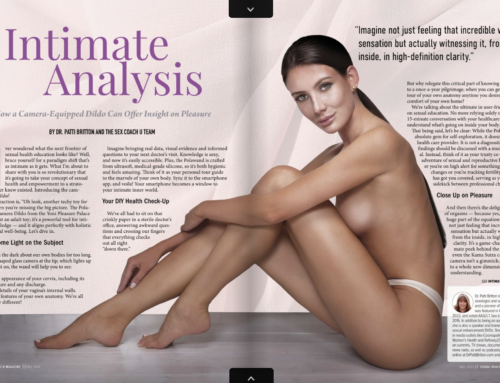Body neutrality is a new concept intended to help people bridge the gap between self-loathing and self-love. The way we perceive our own bodies can influence so much about our lives, especially our sexual experiences. It’s no secret that unrealistic body expectations, body shaming, and societal expectations take huge tolls on our body image. A lack of representation in every form of media doesn’t help. We are all aware of the effects of these standards, so what is the answer?
Body positivity tells us to love the body we have, regardless of how we’re socialized. This is all well and good, and loving your body is often the goal. But how much space exists between self-hate and self-love? Lifetimes of conditioning and socialization are not “fixed” overnight. What does that journey of healing this wound of body-hate look like? Where does it start? Maybe part of the answer lies in the idea of body neutrality.
In an earlier article, we discussed the topic of body grief and how, as sex coaches, we can hold space for our clients during this process. This article will focus on the idea of body neutrality and how sex coaches can use this concept to help their clients take a step on the road to self love.
Body-Neutrality vs. Body-Love

Photo by Unviajesinmaleta from Pexels
Body neutrality or radical body acceptance is the idea of feeling neutral or accepting about our bodies, rather than placing so much emphasis on loving and adoring our bodies. Body neutrality fights the notion that the most important part about who we are as humans is our appearance. Body positivity sells. The desire to love how we look can be manipulated and make us feel like we need a product in order to get there. Body neutrality takes the focus off of appearance entirely, allowing us to shift our energy elsewhere.
Underneath a lot of the negative thought patterns surrounding body image lies the idea that our worth is solely dependent on how desired we are by others. Underneath the “I hate how my body looks” sometimes lies “I am not attractive therefore I am not worthy as a person”. Body neutrality fights this notion by saying all human beings are worthy of acceptance, regardless of our appearance or desirability.
How Sex Coaches Can Help
As sex coaches, our clients often come to us with these negative notions about their bodies. It is a hugely impactful issue regarding sexuality. Our feelings about our bodies can make us feel completely disconnected from sex, unworthy of pleasure, and even disgusted by the idea of pleasurable touch. These are common issues that our clients face. Body neutrality can help break this cycle.
We can help our clients by reframing perspectives and incorporating the idea of body neutrality. If your client has the habit of looking in the mirror and mentally identifying everything they hate about it, walk them through describing a practical aspect of each body part.
- “My legs are too big” could become “My legs allow me to move”
- “My arms are not toned enough” could be transformed into “My arms give me the ability to hug the people I love”
- “My stomach isn’t flat enough” might morph into “My stomach helps me eat delicious food”
You can help your clients begin to shift the narrative away from how their body is visually perceived to how their body practically benefits their life.
In a sexual context, we can help our clients in a similar way. Instead of putting the focus on loving how their body looks, we can shift the focus to what their body allows them to experience. Have your clients practice listing all the different ways their body has the capacity to experience pleasure.
- My body can experience orgasm.
- My body can experience tight hugs.
- My body can experience holding hands with someone.
- My body can experience closeness and cuddles.
This again will shift the focus away from how their body is visually perceived during sex, to how their body functions beneficially for them.
Self-Acceptance
In her book, Come as You Are*, Emily Nagoski talks about something called meta-emotions. Meta-emotions are basically how we feel about how we feel. It’s easy to identify when you have thoughts similar to “I’m upset with myself for feeling this way” or “I hate myself for being so insecure about my body.” Nagoski makes the claim that meta-emotions are actually more important than “regular” emotions. This is because if we are able to practice self-acceptance (that is, accepting and loving ourselves no matter where we are emotionally), we have a better chance of moving through the hard stuff.
As sex coaches, we can attempt to instil the idea that wherever our clients are and however they feel about their bodies – it is all okay. This can help alleviate so much anxiety and feelings of brokenness. Self-acceptance is a key place to begin the work we do as sex coaches.
*Note: To learn more about this book, make sure to tune in to the Ultimate Sex Book Club discussion on this title moderated live by our own Dr. Patti. It’s happening on September 23th, 2020, and you can click here to register!
Continue the Conversation
How do you feel about the idea of body neutrality? Do you think this notion could be helpful for clients struggling with the consequences of societal beauty standards? Join us on Twitter and let us know what you think!
Curious about training to become a Certified Sex Coach™? Join the next live Info Session to meet the SCU team and participate in a live Q&A!




